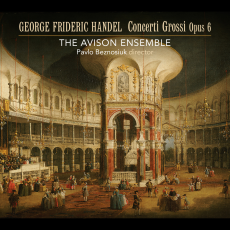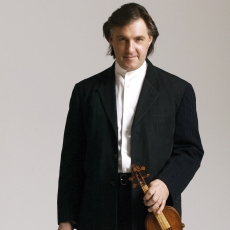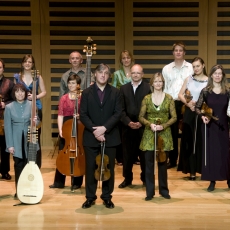The Avsion Ensemble - Handel: Concerti Grossi Opus 6 - International Record Review
The Avison Ensemble is a period instrument-English orchestra led by the celebrated Baroque violinist Pavlo Beznosiuk. On the new recording, it plays Handel's ‘Twelve Grand Concerto's' ([sic] as the publisher Walsh described them in his subscription advertisement) with only strings throughout, ignoring the option of adding two oboes in Concertos Nos. 1, 2, 5 and 6. I think this is a shame, as the winds add a delightful aural tincture. However, as two of the comparison versions do the same thing, it is hardly a reason to overlook this new recording. (I have omitted from the comparisons the recent set by the Australian Brandenburg Orchestra on ABC Classics, reviewed in February 2010, as I am a consultant to that orchestra, but will note that it too opts for the all-string approach.)
The Avison also has the simplest continuo group of the four recordings: two cellos, double bass and harpsichord alone (the last occasionally replaced by an organ, though the booklet omits mention of it). The Academy of Ancient Music adds an archlute, as does Poland's Arte dei Suonatori (under guest conductor Martin Gester), which sometimes alternates with a theorbo and in one concerto an organ replaces the harpsichord. The always effervescent Italian group Il Giardino Armonico uses four cellos, violone and double bass, faggotino (small bassoon), two standard bassoons, archlute, triple harp, archlute two harpsichords and an organ. Uniquely among the recordings under discussion, it also employs two oboes in the four concertos where the choice is given. The Avison Ensemble uses a much smaller string band than the Italians: only eight violins as opposed to 16; but this is the same size as the AAM and slightly larger than the Polish orchestra.
Finally, Linn has given the Avison Ensemble the high-definition hybrid SACD treatment, as did BIS with the Poles. The other two recordings are in CD-only format. Of the four recordings, Linn is easily the clearest and most naturally balanced. It is also attractively produced and presented.
First, in listening to the AAM recording I found it striking how the standard of period string playing by English musicians has improved even since 1997. This is not to say there was anything deficient in the AAM's playing, just that the Avison Ensemble displays an even greater level of confidence and proficiency. Listen to the two groups playing the opening movements of the imperious Concerto No. 10 in D minor and the greater crispness and precision of the Avison Ensemble is patent. Revisiting Il Giardino Armonico in the same piece, one is struck by how, for all the excitement, the ensemble playing is much looser and the string tone less clean - and dare I say less authentic - than either English orchestra. The Polish orchestra's attack is much cleaner than the Italians' and, through careful articulation and immaculate recording, brings out the inner voices in this movement perhaps better than all the others. Where the Avison Ensemble really triumphs in this Concerto, and indeed throughout the set, is in conveying a sense of occasion and musical opulence. Beznosiuk's reading may be less overtly dramatic than the other directors', but he more than compensates for this by his use of gesture and a deeper sense of rhetoric. In the magical Siciliana from Concerto No. 8, for example, there is such delicacy and exquisite craftsmanship that it sounds not just beautiful and touching but seems to say something quote profound about the human heart (as Handel did throughout his operas).
Beznosiuk embellishes much less than the other concertmasters (particularly Enrico Onofri, leader of Il Giardino Armonico); but when he does so, it is masterful. Perhaps he should have done more of it. The Avison Ensemble's principal cellist, Richard Tunnicliffe, and its other solo violinist, presumably Caroline Balding, shine particularly in the concertino parts in Concerto No. 9, Handel's arrangement of his Cukoo and the Nightingale Organ Concerto. They play with less aggression and more grace than the soloists of Il Giardino Armonico and with more personality than Andrew Manze and his AAM colleagues or Arte dei Suonatori.
I confess to being more of an Op. 3 man when it comes to Handel's Concerti grossi. However, this set has so much character, insight and understated drama that I felt as if immersed in a vast 12-act opera without words. Magnificent!


